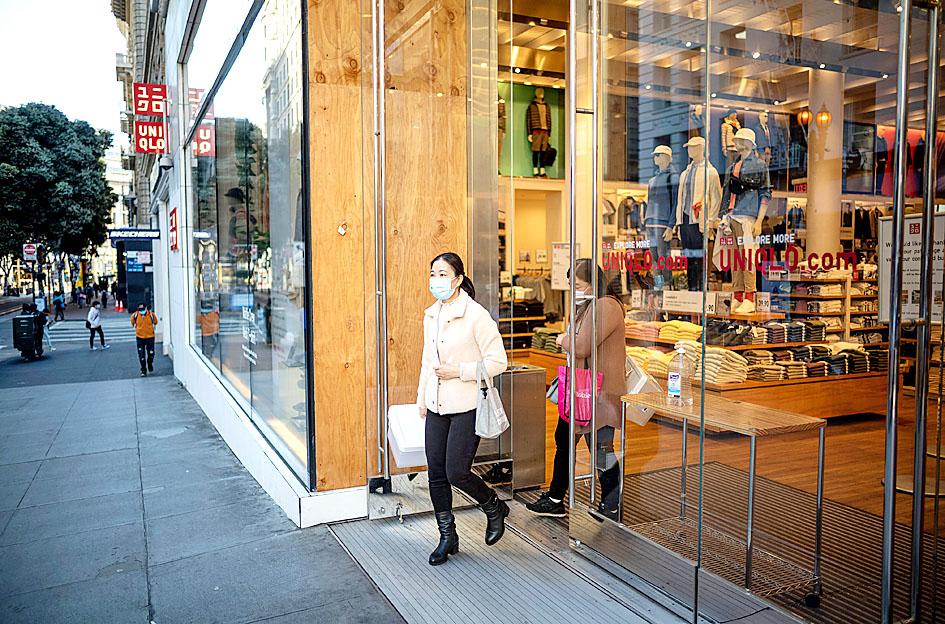US Customs and Border Protection blocked a shipment of Fast Retailing Co’s Uniqlo shirts in January for breaching an order prohibiting imports of items suspected to be produced by forced labor from China’s state-owned Xinjiang Production and Construction Corps (新疆生產建設兵團).
The blockage of Uniqlo’s cotton men’s shirts, which happened at the Port of Los Angeles, was revealed in a document dated Monday last week in which the US agency denied an appeal by Uniqlo to release the shirts.
Uniqlo is the main brand of Asia’s largest apparel retailer, Fast Retailing, and founded by Japan’s richest man, Tadashi Yanai.

Photo: Bloomberg
The US customs document said that Uniqlo had argued and provided proof that the raw cotton used to produce the shirts did not originate from Xinjiang Production and Construction Corps.
However, Uniqlo failed to provide enough information to establish the items were not produced in part by forced labor in China’s Xinjiang region, the customs agency said.
China denies any forced labor, calling it the “biggest lie of the century,” and says its policies are lifting the region out of poverty, boosting the economy and countering extremism.
Chinese Ministry of Foreign Affairs spokesman Zhao Lijian (趙立堅) yesterday reiterated that forced labor is not used in Xinjiang and accused the US of “bullying.”
“Relevant businesses should stand up and oppose the unjustified US behavior,” he said in a regular news briefing.
Uniqlo has not been a key target of boycotts in China compared with rivals such as Hennes & Mauritz AB. Yanai, who is also Fast Retailing’s chief executive officer, has repeatedly declined to comment on Xinjiang, saying the company does not involve itself in political issues.
As of last month, there were 47 Uniqlo stores in the US. Fast Retailing has about 809 Uniqlo stores in mainland China, which make up about one-fifth of revenue for the company.

Three experts in the high technology industry have said that US President Donald Trump’s pledge to impose higher tariffs on Taiwanese semiconductors is part of an effort to force Taiwan Semiconductor Manufacturing Co (TSMC, 台積電) to the negotiating table. In a speech to Republicans on Jan. 27, Trump said he intends to impose tariffs on Taiwan to bring chip production to the US. “The incentive is going to be they’re not going to want to pay a 25, 50 or even a 100 percent tax,” he said. Darson Chiu (邱達生), an economics professor at Taichung-based Tunghai University and director-general of

‘LEGACY CHIPS’: Chinese companies have dramatically increased mature chip production capacity, but the West’s drive for secure supply chains offers a lifeline for Taiwan When Powerchip Technology Corp (力晶科技) entered a deal with the eastern Chinese city of Hefei in 2015 to set up a new chip foundry, it hoped the move would help provide better access to the promising Chinese market. However, nine years later, that Chinese foundry, Nexchip Semiconductor Corp (合晶集成), has become one of its biggest rivals in the legacy chip space, leveraging steep discounts after Beijing’s localization call forced Powerchip to give up the once-lucrative business making integrated circuits for Chinese flat panels. Nexchip is among Chinese foundries quickly winning market share in the crucial US$56.3 billion industry of so-called legacy

Taiwan Semiconductor Manufacturing Co (TSMC, 台積電) yesterday held its first board of directors meeting in the US, at which it did not unveil any new US investments despite mounting tariff threats from US President Donald Trump. Trump has threatened to impose 100 percent tariffs on Taiwan-made chips, prompting market speculation that TSMC might consider boosting its chip capacity in the US or ramping up production of advanced chips such as those using a 2-nanometer technology process at its Arizona fabs ahead of schedule. Speculation also swirled that the chipmaker might consider building its own advanced packaging capacity in the US as part

A move by US President Donald Trump to slap a 25 percent tariff on all steel imports is expected to place Taiwan-made steel, which already has a 25 percent tariff, on an equal footing, the Taiwan Steel & Iron Industries Association said yesterday. Speaking with CNA, association chairman Hwang Chien-chih (黃建智) said such an equal footing is expected to boost Taiwan’s competitive edge against other countries in the US market, describing the tariffs as "positive" for Taiwanese steel exporters. On Monday, Trump signed two executive orders imposing the new metal tariffs on imported steel and aluminum with no exceptions and exemptions, effective